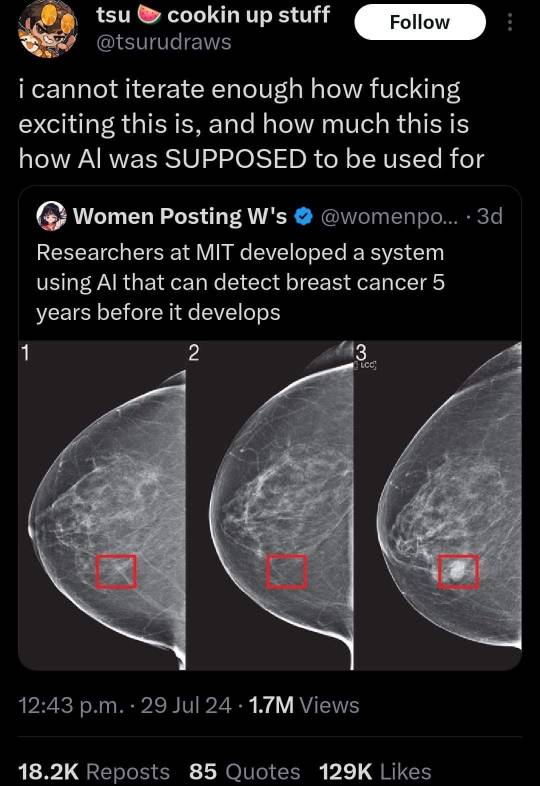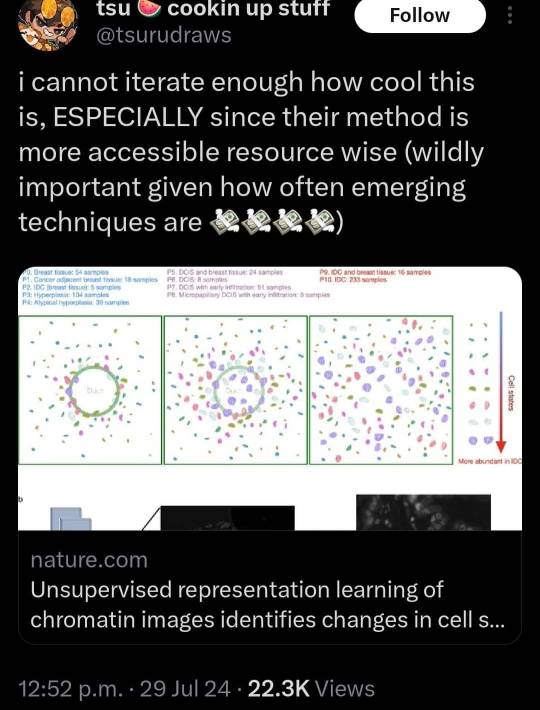Scientist studying health equity and harm reduction. I have both lived and professional experience with these topics. Ask me questions about health policy stuff any time 🩷
Don't wanna be here? Send us removal request.
Text
scientists wont tell you this! (because it's not true)
experts don't want you to know this! (because it's made up)
doctors HATE this one trick! (because it's dangerous and unhealthy)
63K notes
·
View notes
Text
remember folks, when you say “all people deserve food and water and shelter and healthcare and income.” that includes the people you don’t like.
the definition of all: used to refer to the whole quantity or extent of a particular group or thing.
another definition: completely
and one more for the road: consisting entirely of.
human rights include ALL humans, not just the ones you like.
2K notes
·
View notes
Text
imagine being a cia guy who's been trying to set up bay of pigs 2 for the last ten years but now elon musk is cancelling it because he saw a line item called like "Promoting Political Engagement Among Cuban-Americans" and was like 'hmm, too Woke, scrap it' id overdose on the leftover mkultra drugs then and there
9K notes
·
View notes
Text
“I hate school I’m sorry Malala”- Funny yet poignant. Acknowledges both the difficulty of the task and the fact that doing that task is a privilege. Gives credit to the people who fought for that privilege with a tongue in cheek acknowledgement of the irony of the initial statement
“I’m just a girl I should be home baking bread not doing calculus” - at best historically uninformed at worst leaps decades back in time. Refusal to acknowledge the charged history of education and slights the centuries of women’s labor it took to reach this point
53K notes
·
View notes
Text
Putting bioessentialist up on the high shelf until tumblr users understand that it's not just a word for when someone says genders are different
4K notes
·
View notes
Text
What do you mean trump changed covid.gov to say covid was made in a lab i'm going to fucking lose it

[edit to add: covid isn’t over, wear a mask in public spaces !!!]
3K notes
·
View notes
Text

Uhhhhhhhh that seems bad
#so keep in mind that disease registries are actually already super common and aren't necessarily a bad thing in and of themselves#for instance we keep national registries of cancer cases EDS cases cystic fibrosis cases etc#what's bad here is that autism isn't uniquely hard to study like eds or cf#and people's health records are being automatically included without their consent which is usually only done for things like TB#where we have a compelling reason to need to exactly track the spread of something#this also isn't a community led effort unlike the eds and cf registries#it's not clear from this post whether data will be kept anonymous... I would actually assume yes#just based on what i know of like how federal health archives work#storing people's actual names and addresses and stuff would be a big no no#it's still creepy as hell though
64K notes
·
View notes
Text
“Some Principles of Harm Reduction
Meet People Where They Are is one of the mottos of harm reduction. It means not only physically showing up to people where they are at and offering education and tools, but the phrase can also be applied metaphorically - it means meeting someone at the mindset they are operating from, meeting them at where they are operating. It means working from an open perspective and showing up for folks without judgement.
Any Possible Positive Change means just that. If a person is engaging with activities that may be risky, like having unprotected sex, as a harm reductionist I will offer them education and supplies that may help them to make a different choice. I am not going to tell them what that choice needs to be; I am just going to offer the education about risks and about options to reduce risk, and leave it up to the person to make their own choices about what changes they may make. For example, using a condom some of the time, or with some people, is less risky than never using a condom.
Nothing About Us Without Us - Peer Leadership This phrase is held true and dear by many communities including disability rights, sex worker rights, and the Harm Reduction movement. What these communities have in common is that they hold peer leadership as a central value. What this means is that people with lived experience of drug use, sex work, and often unhoused life, for instance, are central to the movement. Legislation and organizational structure and movement values all inform the input and vantage points of folks with lived experience.”
LaSara Firefox Allen, What's Harm Reduction?
206 notes
·
View notes
Text
things that happened to me when i was a woman in STEM:
an advisor humiliated me in front of an entire lab group because of a call I made in his place when he wouldn't reply to my e-mails for months
he later delegated part of my master's thesis work to a 19-year old male undergrad without my approval
a male scientist at a NASA conference looked me up and down and asked when i was graduating and if i was open to a job at his company. right before inquiring what my ethnicity was because i "looked exotic"
a random male member of the public began talking over me and my female advisor, an oceanographer with a pHD and decades of experience, saying he knew more about oceanography than us
things that have happened to me since becoming a man in STEM:
being asked consistently for advice on projects despite being completely new to a position
male colleagues approaching me to drop candid information regarding our partners / higher ups that I was not privy to before
lenience toward my work in a way I haven't experienced before. incredible understanding when I need to take time off to care for my family.
conference rooms go silent when I start talking. no side chatter. I get a baseline level of attention and focus from people that's very unfamiliar and genuinely difficult for me to wrap my head around.
like. yes some PI's will still be assholes regardless of the gender of their subordinates but, I've lived this transition. misogyny in STEM is killing women's careers, and trans men can and do experience male privilege.
81K notes
·
View notes
Text
u ever think about how some mental health disorders literally have criminal activity as a criteria…like not even pretending just straight up “if you don’t follow the laws of the state you’re insane” hmmm wonder why that might be
5K notes
·
View notes
Text

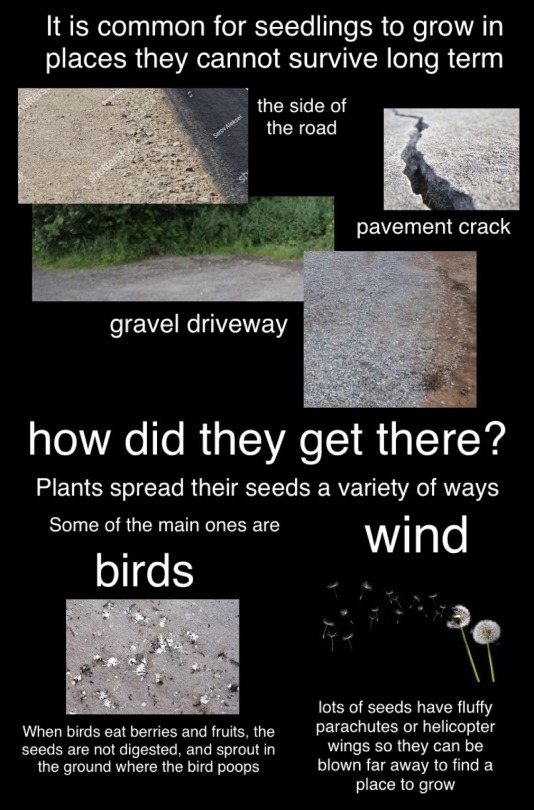
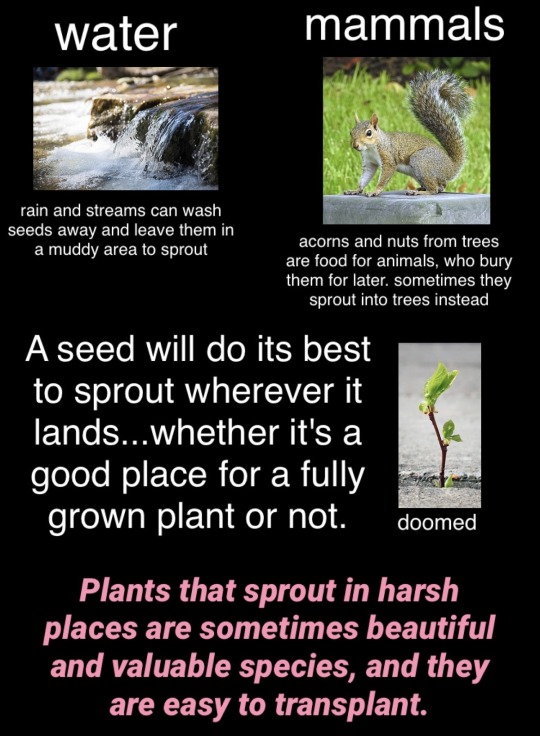
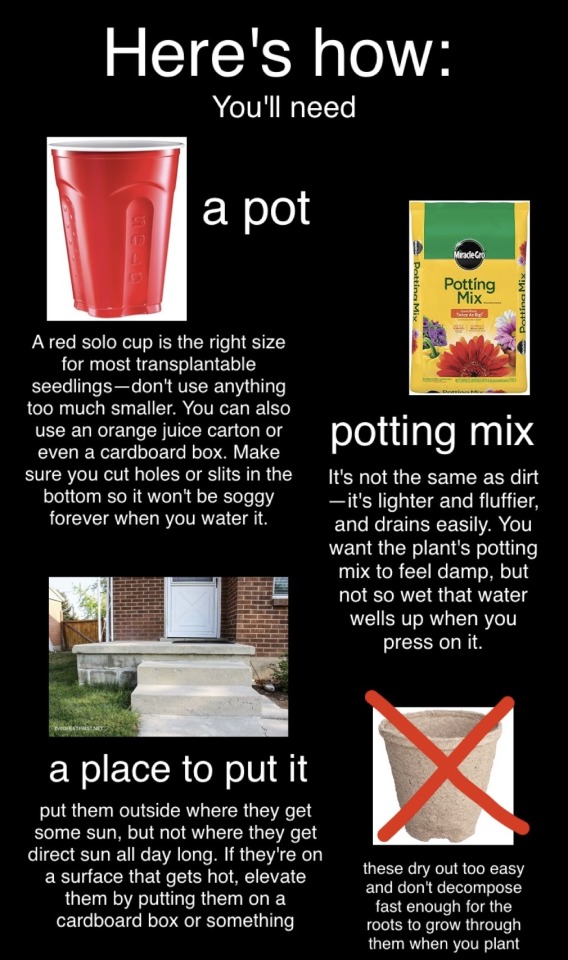
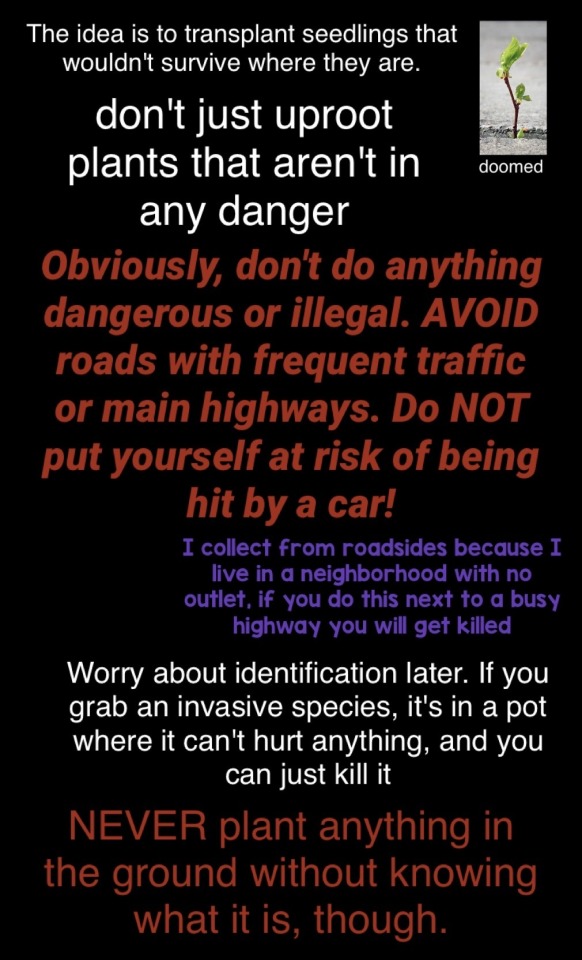


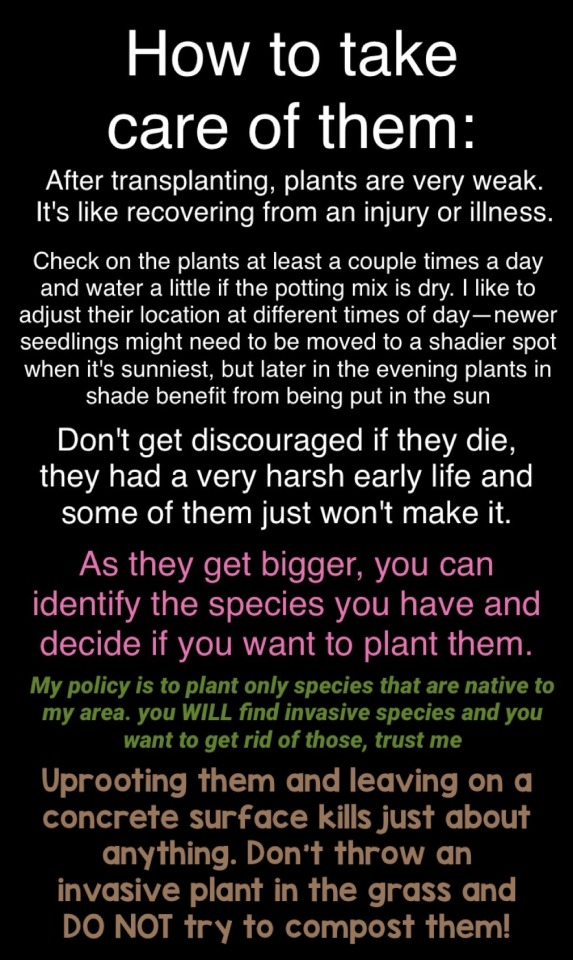

as promised, the transplanting tutorial
most sources make transplanting sound incredibly difficult, but transplanting young seedlings from areas with sparse dirt, like a driveway or roadside, is actually incredibly easy and can get you some great stuff. Once I worked out the method, i've had a very high survival rate
it took me like a month of trial and error to figure this out so you don't have to.
Feel free to repost, no need for credit
31K notes
·
View notes
Text
The City Nature Challenge 2025 is due to kick off in a few weeks, April 25-28, a one-weekend challenge to go out and observe and record as many living, wild things as possible. As a researcher recently pointed out to me, we are creating data points. We are providing hard evidence that this species was right there, on this day. There literally aren't enough scientists in the world to do this kind of research, let alone the funding. And who knows, maybe you'll discover a new species!
All you need is an iNaturalist account accessible through an app or browser, a camera, and access to the world we live in.
I challenge each of you to check your own cities to see if they are participating, or join the global challenge in the link. Take your camera and go outside - look at bugs and plants and animals and mold and fungus. Look at the lichen growing on the fence you pass everyday - what kind is it? What kind of ants are carrying the crumbs away at the picnic? What kind of squirrel is making that racket up in the tree? Pick a plant you walk past everyday, a weed or grass, something you've dismissed a thousand times - what is it?
Get curious. Get involved.
125 notes
·
View notes
Text
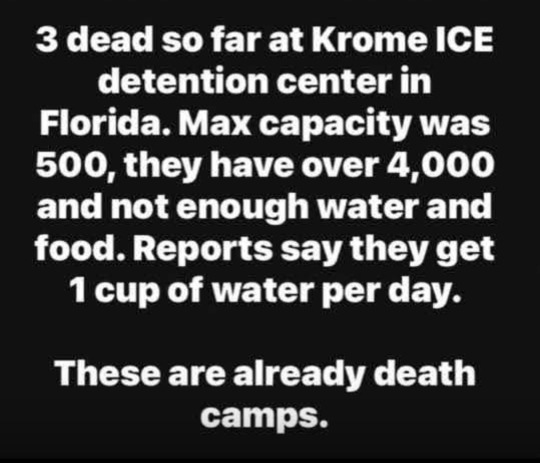
THE ERA OF VANISHING HAS BEGUN
They are not arresting people. They are vanishing them.
Rumeysa Ozturk wasn’t read her rights. She wasn’t told why she was being detained. She was walking to break her fast in Somerville, Massachusetts when masked men in an unmarked SUV pulled up, took her phone, slapped on handcuffs, and dragged her into a vehicle like she was some kind of national security threat.
She’s a doctoral student. A Fulbright scholar. A trauma researcher. But in Donald Trump’s America, she fit the profile: Muslim, foreign-born, sympathetic to Palestinians.
Now she’s locked in a for-profit detention center in Louisiana, hundreds of miles from her lawyer, after a federal judge specifically said she wasn’t to be moved.
They moved her anyway. Because rules no longer apply to those with badges — real or fake.
A MOVEMENT BUILT ON CHAINS AND COWARDS
Alireza Doroudi is gone too.
He’s a doctoral student at the University of Alabama, born in Iran, studying mechanical engineering. No criminal record. No warning. Just scooped off the grid.
ICE refuses to say where he’s being held. No public charge has been announced. His only crime appears to be existing in the wrong body, from the wrong country, in the wrong era.
Mahmoud Khalil was next — a Columbia student, arrested for leading pro-Palestinian protests. Trump labeled him a “radical foreign Hamas sympathizer” on Truth Social. Days later, he was gone.
Jeanette Vizguerra was taken from her Target shift in Colorado, chained at the waist.
Alfredo “Lelo” Juarez, a farmworker organizer, was dragged from his car at dawn in Washington. His window was smashed by federal agents. His voice silenced.
These aren’t isolated incidents. These are deliberate acts of political intimidation.
They are testing the system — testing us — to see how many people they can disappear before we stop calling it democracy.
WHEN ICE IS A BADGE — AND A COSTUME
While the real ICE disappears scholars, organizers, and mothers, the fakes are circling like vultures.
In South Carolina, Sean-Michael Johnson posed as an ICE officer. He pulled over a van of Latino men, screamed slurs, jiggled their keys, and knocked a phone out of someone’s hand. “You’re going back to Mexico!” he shouted. He wasn’t an agent — but he played one with conviction.
In North Carolina, Carl Thomas Bennett used a fake badge to sexually assault a woman at a motel. He told her if she didn’t comply, he’d have her deported. He held up a counterfeit ID and pretended to be the state.
And in Philadelphia, a Temple University student in an “ICE” shirt tried to storm a dorm building with two accomplices. They were dressed for the part, intoxicated by the illusion of authority, emboldened by the climate.
This is what happens when the state makes cruelty a brand. When a badge becomes a fetish object. When the line between enforcement and cosplay disappears altogether.
THE WHOLE SYSTEM IS THE CRIME
Let’s stop pretending this is a coincidence.
This is a unified strategy. The Trump administration is using ICE like a personal strike force — targeting international students, protest leaders, organizers, and mothers with surgical precision.
They invoke secret designations. They bypass due process. They manufacture pretexts out of thin air and rely on the fog of bureaucracy to hide the blood on the floor.
The point isn’t law enforcement. The point is deterrence. Spectacle. Control.
This is what political cleansing looks like when it’s dressed up in the language of national security.
They’re showing the world that resistance has a cost — and the cost is your freedom, your voice, your visibility, your future.
SILENCE IS CONSENT. AND WE ARE LOUD.
There is no middle ground here. No fence to sit on. No neutral position when people are being kidnapped in the name of the state.
ICE doesn’t need your applause. It needs your silence. Every time a student vanishes and the media shrugs, every time a woman is cuffed and the public looks away, the machine gets stronger.
They are daring us to ignore it. They are counting on our numbness. They are betting that we’ll keep scrolling.
We cannot let them win.
This is not border policy. This is not visa enforcement. This is not safety.This is authoritarianism with a PowerPoint presentation.This is fascism disguised as formality.
This is the state stripping people from the land and pretending it’s order.
Let the record show:
They took people.
And we did not look away.
We saw it.
We named it.
We raised hell.
And we did not stop.
(I didn’t write this. Credit goes to Fear and Loathing: Closer to the Edge)
3K notes
·
View notes
Text
...okay listen. I get that the folks who posted and reblogged this probably don't have backgrounds in global health or the politics of foreign aid, and were really genuinely just trying to spread a little hope while the world is batshit awful. But it's important to understand that programs like these are part of a broader system of neocolonialism, and are disproportionately funded over scientifically-backed solutions for solving global problems. When you see a news article about a group of (probably mostly White!) people from the Global North with minimal training in a field building things to help Black or Brown people from the Global South, it's important to ask yourself some questions:
1. Do you think people from the Global North are more capable of solving this problem than people from the Global South? For instance, could we have given those solar panel building kits to students in Uganda instead?
2. If this was an important educational opportunity or an opportunity for personal growth for people in the Global North, why were they more deserving of those opportunities than people in the Global South?
3. In what ways does this project serve to assuage people's feelings of guilt about historical colonialism and racism?
4. Who might benefit from keeping interesting educational opportunities and knowledge of how to solve world problems concentrated in the Global North?
5. Why do you think initiatives where untrained White people build things for the Global South are so common?
"Seventh graders at Thurgood Marshall Middle School in Rockford, Illinois are learning about STEM — but they’re also learning about real-world challenges.
The students have taken on a new project: assembling “solar suitcases” to help bring electricity to schools in Uganda’s Bidi Bidi Refugee Settlement, which is home to 270,000 South Sudanese refugees.
It’s an initiative led by We Share Solar, a nonprofit that provides science and technology learning projects for students that then go on to benefit other students in low-income areas of the world.
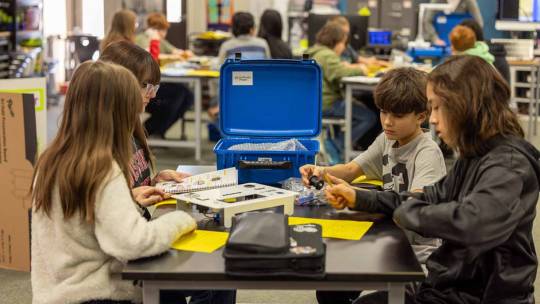
The project introduces middle schoolers to fundamental electrical concepts, like positive and negative charges, voltage, amps, and wiring, ultimately producing a 12-volt DC solar power system that will be distributed among the refugee community.
“We’ve learned many things like positives and negatives, amps, volts, all that stuff, and how to wire stuff together,” Pratham Mehta, one of the Thurgood Marshall students, told WIFR News.
“We’re taking all this stuff for granted, and other countries don’t have all this stuff, like electricity.”
The suitcases will bring electricity to 40 schools in the refugee settlement, which provide education to over 12,000 students. They are designed to be easily transported (thus the suitcase design), which makes them ideal for off-grid locations, like a refugee camp.
The panels in the suitcase collect sunlight and harness the energy in a built-in battery. It can then provide power to up to five light bulbs for 50 to 60 hours a week. Depending on the capacity of the system, it can also help power small electronics like phones or radios.
For people in the Bidi Bidi settlement — one of the largest refugee settlements in the world — this kind of power can make an enormous impact.
In fact, We Share Solar has deployed over 1,000 suitcases to “energy-scarce locations” across the world, with more than 500,000 students and teachers benefitting from the power they provide.
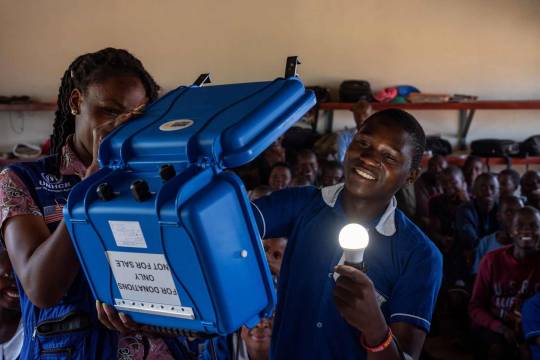
“The We Share Solar education program serves youth twice,” Hal Aronson, co-founder of the organization, said, “first as an educational experience for American youth and second as a renewable power and lighting system for youth in parts of the world that lack electricity.”
Along with connecting students to learning opportunities, the organization ensures each device is tested by a professional to ensure it is built to withstand energy demands. Then, the suitcases are installed by trained partners in destination countries, and students and teachers alike learn about the new clean energy technologies they have implemented.
At the start of the 2024 school year, the We Share Solar program was implemented in 13 Illinois schools, training educators in the curriculum and setting up the project across the state.
“This is just the beginning,” a Facebook post from We Share Solar states. “These passionate teachers will now guide their students in building solar cases, providing a hands-on STEM experience with real-world impact.”
-via GoodGoodGood, January 16, 2025
602 notes
·
View notes
Text
so i am going to put a break down of all of the things with pip to help other people understand
pip is personal independence payment. it doesnt change because of your job or how much money you make already. pip exists to give people money to pay for being disabled because being disabled is more expensive than being abled
for example, mike and john work at mcdonalds. mike has a disability. john doesnt. both of them make the same amount of money. both of them spend their work money on bills.
but mike needs a wheelchair, and he has to pay for his wheelchair repairs because he didnt get it on the nhs. mike wont be given more money from his job because hes disabled, so how does mike pay for his extra costs?
mike is given pip. this helps him pay for a lot of the extra things he needs, meaning he can stay in work because without his wheelchair he wouldnt be able to work at all and would lose everything. this is why taking away pip doesnt make people start working
pip is in two categories. daily living and mobility. there are questions in both categories and you get points for them.
for example (i cant give complex and specific examples, so this wont be accurate but it is similar to the real thing)
i can eat by myself - 0 points, i can eat with a bit of help - 2 points, i can eat with a lot of help - 4 points, i need to be fully fed by another person - 8 points
the other questions are things like do you need help getting dressed, do you need help going to the toilet, and they all look something like this but the points bits are a lot more specific than the example i gave
across the whole daily living category you add all your points up to the end, and if you get 8-11 points total you get daily living pip. if you get 12+ you get enhanced pip which means more money
so for example, mike got 2 points on every single question. this means he has 20 total points, so he gets enhanced pip meaning he gets the most money he can for the daily living section
the mobility section works similar, but i am leaving it out because thats not what the uk government want to change.
labours (they are in charge of the uk government) new change says that they want you to have 4 points on at least one question in daily living, and if you dont, you dont get pip.
so lets go back to my example mike, who got 20 points because of 2 points on every question, now has his enhanced pip taken away, because he didnt get 4 points on any of them.
but, for example, mike uses his mobility pip on the motability scheme. this means all of the money he gets for the mobility section pays for his adapted car, which also gets him to work. so he would use the rest of his money from the daily living section to pay for his wheelchair.
under labours new idea, mike wont be able to pay for his wheelchair, because his daily living money will stop. mike might have to choose between his car and his wheelchair. either way, mike cant go to work anymore. now mike cant pay for his bills, and mike is very poor and suffering.
up to a million people or more might lose pip entirely. this will mostly effect people with low support needs mental disabilities, and a lot of medium support needs people too.
this will also mostly effect people with mental illnesses. these people spend their pip on things like therapy, sensory toys, medicine, easy meals, snacks, lots of things.
there are NO RULES about what you spend your pip on, but most people still spend it on things they absolutely need
i was really scared at first that i would have it taken off me. it wont because im too severe and i get enough points. someone like me with high support needs wont be affected by this change but theres another change that will.
when inflation happens, it means everything costs more money. so for example mike needs to pay for his wheelchair repair, but inflation has happened so mikes wheelchair repair went from £200 to £300.
this is okay because pip rises with inflation, which means that when everything costs more money, mike gets more money from pip to make up for it
labours idea is to freeze that. so mikes wheelchair repair has now gone up from £300 to £500, but labour froze pip so mike doesnt get more money this time, and now mike cant afford to pay for his wheelchair repair.
now mike cant go to work, and might have to wait months to get his wheelchair repaired by saving up the money, so mike loses his job anyway because hes not there for months.
all of these ideas are very bad. there are other things labour can do to get money but they dont want to do them. instead they are targeting disabled people because they dont like us and they want us to work. labour says things that make regular abled people think that disabled people are the reason the uk is struggling. we need to fight this
535 notes
·
View notes
